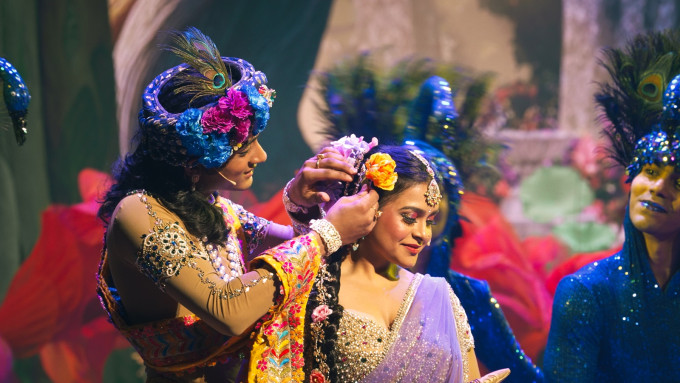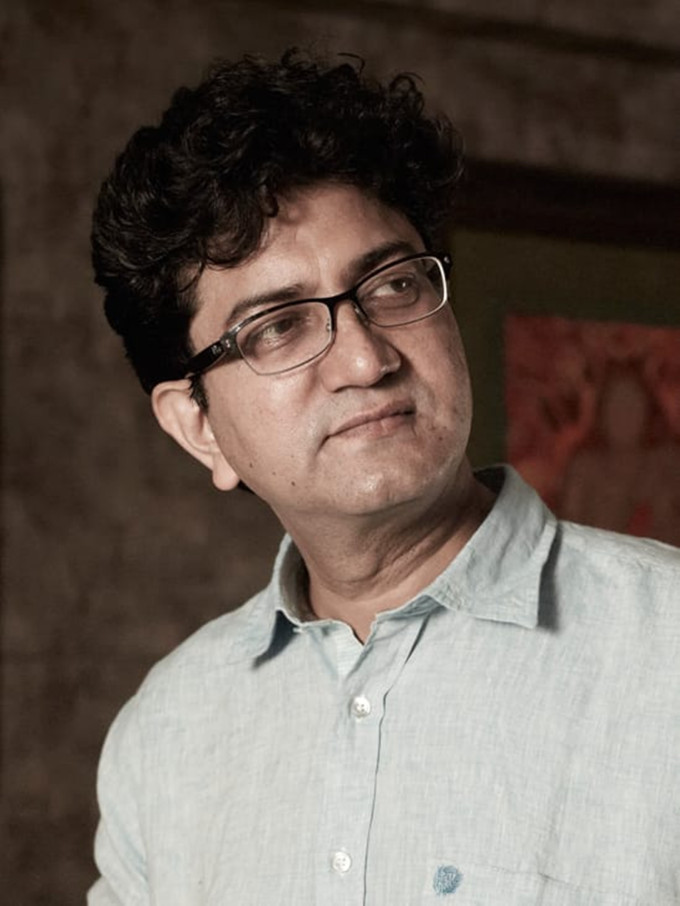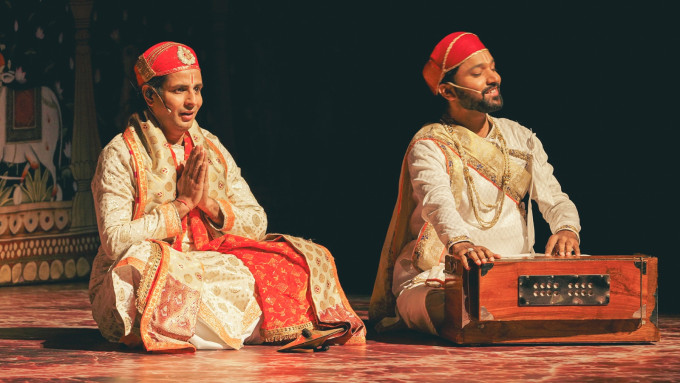‘Relationships today are not as beautiful’: Prasoon Joshi on crafting timeless tales for modern Indian audience
Not many voices in Indian storytelling stand out with the kind of authenticity and originality Prasoon Joshi embodies. His contributions to Hindi cinema and advertising have consistently expanded the boundaries of creativity, weaving together his unique experiences and cultural roots into lyrics and stories that resonate deeply. From the ground-breaking lines of Rang De Basanti to the soulful compositions of Taare Zameen Par, his words capture emotions that are universal and deeply personal.
In his latest endeavour, Joshi continues to push the frontiers of Indian storytelling with the world’s first mega musical centered on Shri Krishna, titled Rajadhiraaj: Love, Life, Leela. This production––with a cast of over 100 performers and stunning visuals at the Nita Mukesh Ambani Cultural Centre (NMACC) in Mumbai––explores the untold stories of Krishna, offering a vivid portrayal of his dual journeys from Vraj to Mewar and Mathura to Dwarka.

In an interview with indianexpress.com, the Padma Shree awardee shares insights into his creative process, spiritual journey, upbringing in Uttarakhand, and the challenges of bringing this epic tale to the stage. Read the edited excerpts below:
 Rajadhiraaj offers a vivid glimpse into the dual journeys of Shri Krishna from Vraj to Mewar and Mathura to Dwarka (Source: PR Handout)
Rajadhiraaj offers a vivid glimpse into the dual journeys of Shri Krishna from Vraj to Mewar and Mathura to Dwarka (Source: PR Handout)
Q: Your work has resonated deeply with audiences across various mediums. How has your writing evolved, and what drives you to continue exploring new narratives?
Prasoon Joshi: Exploration drives my creative process, pushing me to uncover new aspects of my craft and self. From addressing dyslexia in Taare Zameen Par to exploring sports in Bhaag Milkha Bhaag, each project broadens my perspective. With Rajadhiraaj, I immersed myself in the vast and complex subject of Krishna. My spiritual background and extensive research helped me present this timeless story through a contemporary lens.
Q: How do you strike a balance between artistic expression and commercial success in your projects?
Prasoon Joshi: For me, authenticity is paramount. Commercial success follows when you genuinely connect with people. When that happens, commercial success often follows. Take Rang De Basanti for example — I tapped into authentic youth experiences from my college days. Similarly, with ‘Rajadhiraaj’, I drew from my spiritual upbringing in Uttarakhand.
Q: What aspects of Shri Krishna’s life did you find most compelling to bring to the stage?
Prasoon Joshi:I approached Krishna’s story from the perspective that Krishna is what you seek within yourself. For the people of Vrindavan, he represents child-like innocence. For Radha, he’s a lover. In Dwarka, he’s seen as a ruler. To Arjun, he’s a philosophical guide. I wanted to explore how Krishna adapts to fulfill different spiritual needs, emphasising that the truth lies in those who seek.
Q: How did you approach intertwining Shri Krishna’s dual journeys from Vraj to Mewar and Mathura to Dwarka? Were there any particular challenges in ensuring a seamless narrative?
Prasoon Joshi: The biggest challenge — and the reason I was brought on board — was weaving together various aspects of Krishna’s life with clarity. I established different vantage points to view Krishna, sacrificing some well-known stories due to time constraints, and including lesser-known tales, like that of Jambavan, to offer a fresh perspective. The key was balancing familiar and unfamiliar elements while maintaining the central message.
 “I grew accustomed to seeing people come to meditate or explore spiritual paths,” Prasoon said about his upbringing. (Source: X)
“I grew accustomed to seeing people come to meditate or explore spiritual paths,” Prasoon said about his upbringing. (Source: X)
Q: Shri Krishna holds deep cultural and spiritual significance in India. How did you ensure that the portrayal of Rajadhiraaj resonates with both devout followers and the general audience?
Prasoon Joshi: I had great people to test this — Dhanraj Nathwani, who conceptualised Rajadhiraaj, and executive producer Bhoomi Nathwani — both devout followers. My spiritual upbringing in Uttarakhand shaped my approach, but the challenge was connecting with those who see Krishna differently. I realised that Krishna touches on universal emotions — like the mother-child bond, love, and justice — that resonate with everyone. For example, the scene where Krishna leaves for Mathura brings tears to all, regardless of their level of devotion. I’ve tried to capture this authenticity.
Q: How did this all start? Whose brainchild was this?
Prasoon Joshi: This project is the brainchild of Dhanraj ji and Bhoomi ji. As Krishna devotees, they had the desire to create something like this, but needed help with form and execution. That’s where I saw my role—to humbly contribute. Writing these love songs and connecting with this rich tradition has been a beautiful experience. In the process, I’ve grown, becoming gentler and softer in my approach. Krishna’s water-like quality, a softness that engulfs you, has truly influenced me.
Q: Can you share a little bit about your journey?
Prasoon Joshi: I’m proud to have been born in Uttarakhand, a place that instilled a sense of liberation in me from a young age. As a hub for seekers from around the world, I was exposed to a wide range of thinkers and philosophies, from Vedantic scholars to those studying Western philosophy like Hegel, Kant, Derrida, and Lacan.
My upbringing was deeply influenced by music, as both my parents were classical musicians. I learned Indian classical music for a few years before studying physics. This diverse background has allowed me to draw intriguing connections, such as between spirituality and AI or Vedantic ideas and quantum physics.
Poetry has been another crucial dimension of my life — not just reading poems, but experiencing the poetry of life through relationships and human connections. These three elements — spirituality, science, and poetry — have profoundly shaped my worldview.
I also draw inspiration from the strong women in my life, especially my grandmother. She lost her husband at 19, was initially illiterate, but eventually retired as a school principal. Her journey taught me the essence of true feminist values.
Q: How did your foray into the world of advertising and Bollywood begin?
Prasoon Joshi: As a middle-class person, education was paramount. After completing my MBA from IMT Ghaziabad, I sought to establish myself financially. Advertising provided that foundation, allowing me to utilise my language skills and thinking abilities.
Over time, people appreciated my work, and I eventually became the chairman of Asia Pacific for McCann, one of the world’s largest advertising firms. I’ve managed to balance my day job in advertising with my passion for writing songs, stories, and plays.
Q: Writing for a live musical is different from film or television. How did you adapt your storytelling techniques to engage a live audience?
Prasoon Joshi: While I had experience writing and directing plays in college, this musical was a new challenge. Working with a fantastic team, including Shruti Sharma and Parthiv Gohil, helped immensely. My background as a natural storyteller allowed me to visualise how dialogues could seamlessly transition into songs.
Collaborating with music directors Sachin and Jigar was a joy. We used songs to advance the story, especially when dialogues became too heavy. This approach helped maintain audience engagement throughout the performance.
 20 original songs were composed by ace music composers Sachin-Jigar, blending Indian classical music with a Western symphony orchestra (Source: PR Handout)
20 original songs were composed by ace music composers Sachin-Jigar, blending Indian classical music with a Western symphony orchestra (Source: PR Handout)
Q: In the present day, many young people are becoming inquisitive about Hindu scriptures and philosophies. What do you think can be done to encourage more children to read and understand them?
Prasoon Joshi: Parents play a crucial role in presenting our scriptures and stories in ways that resonate with today’s generation. We need to simplify these narratives while instilling pride in our civilisation.
Unfortunately, youngsters are led to believe there’s little to be proud of in our heritage. While logic is important, emotional connection is essential, as younger generations are forgetting how to feel. Our scriptures were meant to evoke emotion, and relationships today suffer from a lack of grace.
Simplifying and modernising these messages is key, and addressing youthful curiosity is vital. In this play, I’ve included a young girl’s character who asks naïve questions, and her father answers. Both aspects are important — understanding that our perception in Indian civilisation is different, and simplifying and modernising our messages.
Q: What advice would you give to young lyricists and writers who look up to you?
Prasoon Joshi: Be brave and be yourself. Embrace your unique experiences and perspectives. When I entered the film industry, I didn’t conform to existing norms, and stayed true to my background from Uttarakhand. I brought my own vocabulary and way of expressing myself. Don’t shy away from expressing your individuality—have confidence in your authentic voice.
📣 For more lifestyle news, click here to join our WhatsApp Channel and also follow us on Instagram
Disclaimer: The copyright of this article belongs to the original author. Reposting this article is solely for the purpose of information dissemination and does not constitute any investment advice. If there is any infringement, please contact us immediately. We will make corrections or deletions as necessary. Thank you.
